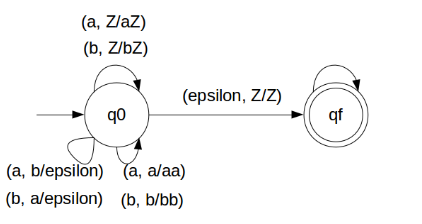
This is the PDA to accept strings with equal number of $a$'s and $b$'s. The $\epsilon$ transition in the first state is causing nondeterminism. When we have input a with Z at the bottom of the stack, then at the beginning it can do $(a,Z/aZ)$ or $(\epsilon,Z/Z)$ and go to final state, so automaton has 2 choices which can lead to 2 different states.
How do I convert it to DPDA ? How do I remove that $\epsilon$ transition from first state to make the PDA deterministic?
Here, the stack symbol is $Z$ and the transition $(a,Z/aZ)$ means on seeing input $a$ with $Z$ at the top of the stack, push $aZ$.
